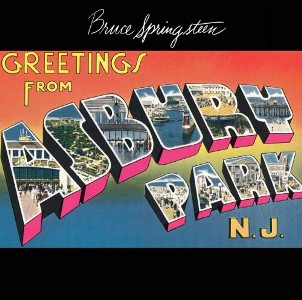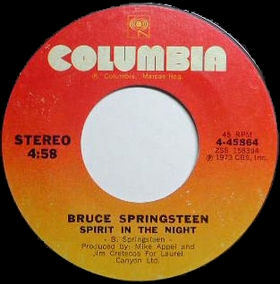Related Research Articles

Bruce Frederick Joseph Springsteen is an American singer, songwriter, and musician. He has released 20 studio albums, most of which feature his backing band, the E Street Band. Originally from the Jersey Shore, he is one of the originators of the heartland rock style of music, combining mainstream rock musical style with narrative songs about working class American life. During a career that has spanned six decades, Springsteen has become known for his poetic, socially conscious lyrics and energetic stage performances, sometimes lasting up to four hours. He has been nicknamed "The Boss".

Dream Theater is an American progressive metal band formed in 1985 under the name Majesty by John Petrucci, John Myung and Mike Portnoy while they attended Berklee College of Music in Boston, Massachusetts. They subsequently dropped out of their studies to concentrate further on the band that would eventually become Dream Theater. Their current lineup consists of Petrucci, Myung, vocalist James LaBrie, keyboardist Jordan Rudess and drummer Mike Mangini.

Greetings from Asbury Park, N.J. is the debut studio album by American singer-songwriter Bruce Springsteen. It was produced by Mike Appel and Jim Cretecos from June through October 1972 at the budget-priced 914 Sound Studios. The album was released January 5, 1973, by Columbia Records to average sales but positive critical reviews.

The Wild, the Innocent & the E Street Shuffle is the second studio album by American rock singer-songwriter Bruce Springsteen. It was recorded by Springsteen with the E Street Band at 914 Sound Studios, Blauvelt, New York, and released on November 5, 1973 by Columbia Records. It includes the song "Rosalita ", the band's most-used set-closing song through 1985.

"4th of July, Asbury Park (Sandy)", often known just as "Sandy", is a 1973 song by Bruce Springsteen, originally appearing as the second song on his album The Wild, the Innocent & the E Street Shuffle. It was released as a single from the album in Germany.

Born to Run is the third studio album by American singer-songwriter Bruce Springsteen, released on August 25, 1975, by Columbia Records. As his effort to break into the mainstream, the album was a commercial success, peaking at number three on the Billboard 200 and eventually selling seven million copies in the United States. Two singles were released from the album: "Born to Run" and "Tenth Avenue Freeze-Out"; the first helped Springsteen to reach mainstream popularity. The tracks "Thunder Road", "She's the One", and "Jungleland" became staples of album-oriented rock radio and Springsteen concert high points.

"Born to Run" is a song by American singer-songwriter Bruce Springsteen, and the title song of his album Born to Run. Upon its release, music critic Robert Christgau took note of its wall of sound influence and called it "the fulfillment of everything 'Be My Baby' was about and lots more".
"Thunder Road" is a 1975 song written and recorded by Bruce Springsteen, that became the opening track on his breakthrough album Born to Run. One of the artist's most popular songs, while never released as a single, "Thunder Road" is ranked as one of Springsteen's greatest songs and one of the top rock songs in history. It is No. 111 on Rolling Stone's 500 Greatest Songs of All Time list, and also the 103rd best ranked song on critics' all-time lists according to Acclaimed Music.
Vincent Lopez, nicknamed Mad Dog, is an American drummer. Between 1968 and 1974 Lopez backed Bruce Springsteen in several bands, including Steel Mill and the E Street Band. He also played on Springsteen's first two albums, Greetings from Asbury Park, N.J. and The Wild, the Innocent and the E Street Shuffle. Both during and after his time with the E Street Band, Lopez played drums with numerous Jersey Shore bands.

The E Street Band is an American rock band, and has been musician Bruce Springsteen's primary backing band since 1972. The band was inducted into the Rock and Roll Hall of Fame in 2014. For the bulk of Springsteen's recording and performing career, the band consisted of: guitarists Steven Van Zandt, Nils Lofgren, and Patti Scialfa, keyboardists Danny Federici and Roy Bittan, bassist Garry Tallent, drummer Max Weinberg, and saxophonist Clarence Clemons.
Mike Appel is an American music industry manager and record producer, best known for his role in both capacities in the early career of Bruce Springsteen.

Sir Lord Baltimore was an American heavy metal band from Brooklyn, New York City, formed in 1968 by lead vocalist and drummer John Garner, guitarist Louis Dambra, and bassist Gary Justin. Some have cited the 1971 review of their debut record, Kingdom Come, in Creem magazine as containing the first documented use of the term "heavy metal" to refer to a style of music. Sir Lord Baltimore featured a drumming lead singer, traditionally a rarity in rock and metal music. The band is also the first band to be categorized as heavy metal. The group has been called "the godfathers of stoner rock."

The 1975 album Born to Run was Bruce Springsteen's last, best hope for fortune and fame. As such it became a torturous recording process, and to make ends meet Springsteen and the E Street Band toured constantly during the first set of recording sessions for it, performing his new songs as he developed them. Before, during, and immediately after the album's commercially successful release, he toured again, sometimes in battle against his now highly promoted image. Financial success was short-lived, however, as he was soon plunged into legal battles with his former manager and enjoined from further recording. Again he toured to make a living, long after the conventional period of playing in connection with an album's release was over; only when his legal issues were finally resolved did he stop. From 1974 through 1977, these outings are collectively known as the Born to Run tours.

"I'm Goin' Down" is a rock song written and performed by American singer-songwriter Bruce Springsteen. It was released on August 27, 1985 by Columbia Records as the sixth single from his 1984 album Born in the U.S.A. The song was recorded with the E Street Band in May 1982 at the Power Station music studio, and co-produced by Springsteen, Jon Landau, Chuck Plotkin, and Steve Van Zandt. Although Springsteen had changing ideas about the songs to put on the album, "I'm Goin' Down" was ultimately selected for inclusion.

"Fever For The Girl", the legal published title of “The Fever", was written by Bruce Springsteen in late 1971, as evidenced by a dated lyric sheet, titled "(I Got The) Fever For The Girl" on display at the Hard Rock Cafe, Sydney, Australia.
914 Sound Recording Studios, Inc. was a recording studio in Blauvelt, New York, incorporated by Brooks Arthur on August 28, 1970. Some of the artists who recorded tracks and albums in the studio were Bruce Springsteen, Dusty Springfield, Ramones, Janis Ian, Blood, Sweat & Tears and Melanie. It was named after telephone area code 914, which served as the area code for Rockland County until 2000.

"Spirit in the Night" is a song written and originally recorded by American singer/songwriter Bruce Springsteen for his debut album Greetings from Asbury Park, N.J. (1973). It was also the second single released from the album. A cover version performed by Manfred Mann's Earth Band, was released on the album Nightingales and Bombers and as a Top 40 single.
The Castiles were a Freehold, New Jersey-based rock and roll band that featured vocalist/guitarist/harmonica player Bruce Springsteen, and was formed by guitarist/vocalist George Theiss, with various lineups during its existence. They recorded two songs, and performed throughout New Jersey and New York before disbanding in 1968.

"Trapped" is a 1972 song written and recorded by reggae artist Jimmy Cliff and popularized by Bruce Springsteen in the 1980s.
"Darkness on the Edge of Town" is the last song on the 1978 album of the same name, Darkness on the Edge of Town, by Bruce Springsteen. It was the last song recorded and mixed, and in April 1978 was designated the title song. A thematic album whose songs portray the struggles of the less-fortunate, not only to survive, but to keep their spirit and will to live alive, the title track portrays a hard-luck loser in life who refuses to give up. Springsteen's fourth album, released three years after his 1975 effort Born to Run, was delayed two years because of legal problems with his former manager, Mike Appel. Expectations were high after he took one year to complete the album.
References
- ↑ Craig Statham Springsteen: Saint in the City: 1949-1974 2013 0957144237 p.121 "Mike Appel .. As a direct result, he began to learn guitar. The next few years were spent playing in a band that frequently changed its name and produced mostly instrumentals and, as The Camelots, supported Jay and the Americans, and Link Wray ..."
- ↑ Marc Eliot Down Thunder Road: The Making of Bruce Springsteen 1993 p.46 "Mike Appel... We were then called The Camelots and made a record called "The Chase, " which was something of a local hit. We played all the local high schools, backed up The Marvelettes one time in a theater in Newark, New Jersey, and became a sort of house band there. We were the only white faces in this entirely black theater. All the patrons and other acts were black except for us. I was friendly with a black DJ on WNJR; he liked me and was looking for a group of solid musicians who could play everybody else 's records. That was us. We also played other venues ..."